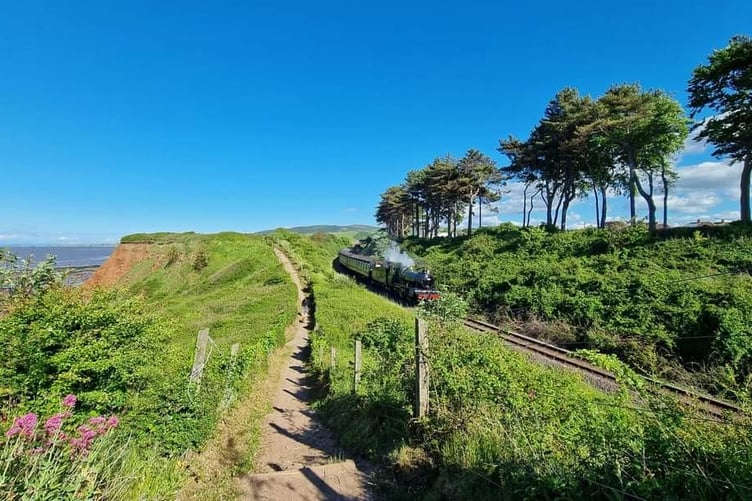MP Ian Liddell-Grainger has called for ‘serious discussions’ about the future of the West Somerset Railway (WSR) after its annual accounts showed a second successive heavy financial loss.
The accounts, which have been sent to shareholders ahead of the railway’s annual meeting in Bishops Lydeard on September 23, showed it lost £216,317 in the year to March 31, 2023.
It was £100,000 less than the previous year’s loss of £316,442, but saw the railway’s auditors warn it could put ‘significant doubt on the company's ability to continue as a going concern’.
Mr Liddell-Grainger said trading in the red to the tune of more than £4,000 a week was an ‘untenable situation’.
He said nobody who supported or travelled on the railway would view the accounts with anything other than alarm.
Mr Liddell-Grainger said: “The West Somerset Railway is a vital component of the local tourism industry and we simply cannot afford to lose it.
“But, it is clear from the state of the line that economies are being made everywhere, particularly in weeding and lineside clearing, yet these are merely stacking up costs which at some point will have to be faced.
“I am still hopeful that we can achieve a connection to Taunton so that regular services can be run on and off the West Somerset Railway.
“But it is clear we are going to have some serious discussions about how the company can be supported to remain in business so this can be achieved.”
WSR chairman Jonathan Jones-Pratt told the Free Press the railway’s position was not a surprise given the nature of the economic state of the country.
Mr Jones-Pratt said extra costs had been adapted into the business model and ‘we are driving the WSR through such challenges’.
He said: “The tourism sector is all affected by this and it is no surprise to anyone, I am sure.
“Our job is to ensure the WSR continues and is protected. The board will achieve this.
“What is positive is that the WSR has an agile model, and it reacts to the reality of the market, the accounting period does not reflect today’s market and changes that have been made.
“I am very pleased with the numbers that are being reported as we stand today.
“We have had a great summer with exceptional loadings, reduced costing of operation, with a sensible timetabling, and healthy margins being achieved.”
Mr Jones-Pratt said nobody could have predicted the surge in energy costs with national and international coal prices challenging margins.
He said: “That said, the national picture for the heritage movement is tough, but the WSR is ahead of others, which is no doubt down to the tough changes made some years ago.
“As the summer months close we are looking forward to our winter celebrations which are set to be very busy, 2024 is also looking very busy with some new exciting business revenue streams to add to the pot.”
Mr Jones-Pratt said the railway’s accounting period also showed continued investment and a healthy balance sheet.
Independent auditor Alexandra Shore, of accountants AC Mole, said WSR directors were confident the company would return to trading profitably in the future and that it had adequate cash reserves to continue trading for at least 12 months.
Ms Shore said: “However, the railway remains in need of regular and significant capital investment.
“In recent years, this investment has been financed from cash reserves as the level of profit generated has not been sufficient.
“In the future, the company will need to generate more profit or identify other ways to finance this continued investment in the railway.”
Mr Jones-Pratt in his chairman’s report to shareholders said it was easy to forget that when the railway’s season started at the beginning of April last year the country was still emerging from the aftermath of the Covid pandemic.
However, he said the season turned out well, despite surprises such as ‘incredibly hot weather’ which meant using diesel engines instead of steam to reduce fire risk, and a landslip near Tribble Bridge, Combe Florey, which cut the line in two.
Passengers and railway volunteers returned in significant numbers and fare income increased significantly, although still below pre-Covid levels.
One of the hard decisions taken was not run a seven-day-a-week railway in 2023, even at the height of the school holidays, the effect of which was being carefully watched to allow a decision to be made about 2024.
Mr Jones-Pratt said the Tribble Bridge embankment slippage had been a good example of how wider support for the railway came together in a crisis, demonstrating how much support there was for WSR from many directions.
He said full repairs were expected to be completed after trains stopped running in November.
In the WSR directors’ strategic report, shareholders were told turnover was up by nearly £300,000 to £2.7 million and the trading deficit before tax was down by more than £120,000 to £262,662.
The railway had cash balances of £482,471, against £510,144 in 2022, and capital expenditure was slashed from £48,337 last year to £29,306.
Fare income for the summer of 2023 was currently exceeding expectations.
The directors identified a key risk for the WSR was maintaining the 140-year-old Victorian railway architecture on the longest heritage track in England.
They said a live three-year plan for investment on maintenance and renewal had now been developed which was constantly updated to reflect new and changed priorities.
The investment required for the following 12 months had already been significantly identified within the WSR’s 2024 budgets.




Comments
This article has no comments yet. Be the first to leave a comment.